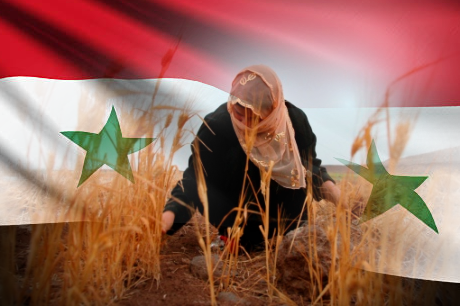Agricultural Cooperatives in the Syrian Arab Republic
- Oct 6, 2018
- 2 min read

Syria is rich of oil resources. Since its independence, it could influence the flow of oil to the NATO imperialist countries. Fearing the independence of Syria, the NATO imperialist countries sought to counter Syria's "oil weapon" through the use of the "food weapon." Syria had a "chronic" food deficit, it has been said. Furthermore, the shackles of colonialism and reaction remained in Syria's agricultural sector. It was therefore necessary for the Ba'athist leaders of the Syrian Arab Republic to revolutionize their agriculture. For the pursuit of the bourgeois democratic revolution, it was necessary for the Ba'ath to drive out the parasitic classes within of Syria, and to achieve food self-sufficiency so to counter the imperialist threat without Syria. This was to be done through the establishment of state farms and peasant cooperatives. The bourgeois-democratic Ba'athist State, inspired by the USSR, provided cheap loans, seeds, fertilizers, services such as mechanized plowing and harvesting, and crop protection to small holders, so to encourage them to form agricultural cooperatives. This system gradually drove out and made bankrupt the paristic old classes of landlords and money lenders who lived off the foreclosure of debt for the acquisition of small holdings. Through this system, by 1983, 85% of peasant families were in some type of cooperative. Despite the continued existence of so-called "chronic" deficit in food, there was a significant growth in agricultural production and the standards of life for the rural people. Unlike other pro-collectivization states, however, Syria did not heavily tax its agricultural cooperatives to finance industrialization. The state used its budget for major hydraulic projects such as the Ghab and Euphrates Basin. Corruption and clientalism did exist. Because of the inflation and the low income of some officials there was tendency to take bribes during the Hafez Al-Assad years. However, overall, the standards of the rural masses dramatically improved. The portion of Syrian land that was state owned was only those of the state farms. After a 2008 drought in Syria, the government of Bashar Al-Assad made some changes to the state farms. The state would retain ownership of the land but would give the right of use to farmers. The cooperatives would continue to exist, until NATO and its regional allies sent in their Wahhabi contras to destroy Syria.
Citation
Proctor, E. M. (2011). Agriculture and Reform in Syria - By Raymond Hinnebusch, Atieh El Hindi, Mounzer Khaddam, and Myriam Ababsa. Digest of Middle East Studies,20(2), 326-329. doi:10.1111/j.1949-3606.2011.00102.x

Comments